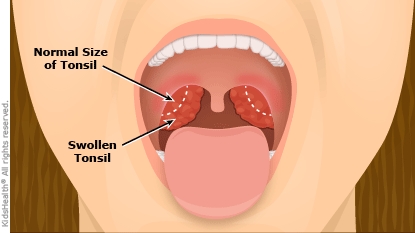Tonsillitis is inflammation (swelling and irritation) of the tonsils caused by a bacterial or viral infection. Most kids feel better in a few days. You can do things at home to make your child more comfortable and to prevent dehydration.



Your child:

Your child:

What are the symptoms of tonsillitis? Common symptoms include a sore throat, fever, swollen glands in the neck, and pain when swallowing. Some kids with tonsillitis will have other symptoms, such as a runny or stuffy nose or a cough.
How do health care providers diagnose and treat tonsillitis? Health care providers will ask about symptoms and examine the throat. They may use a soft cotton swab to gently collect a sample from the tonsils and back of the throat. Most use a rapid strep test to check for bacteria. Results are available in minutes. If the test is negative, they'll send the sample to a lab for a throat culture (results take 1–2 days).
Tonsillitis caused by strep is treated with antibiotics. Kids with tonsillitis due to a virus get better without treatment.